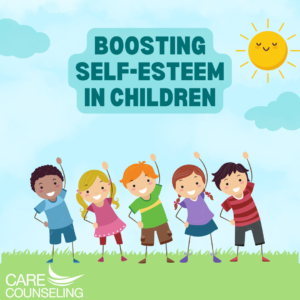Boosting Self-Esteem in Children
 Every child deserves to grow up with a healthy sense of self-esteem, which is crucial for their overall well-being and success. Self-esteem plays a vital role in a child’s ability to develop positive relationships, handle life’s challenges, and thrive academically and socially. As parents, caregivers, and educators, it’s our responsibility to nurture and boost a child’s self-esteem.
Every child deserves to grow up with a healthy sense of self-esteem, which is crucial for their overall well-being and success. Self-esteem plays a vital role in a child’s ability to develop positive relationships, handle life’s challenges, and thrive academically and socially. As parents, caregivers, and educators, it’s our responsibility to nurture and boost a child’s self-esteem.
Why Self-Esteem Matters for Children
Self-esteem is the foundation upon which children build their self-image and their view of their capabilities. It is the belief in their own worth, abilities, and potential. Here’s why self-esteem is so important for children:
- Resilience: Children with high self-esteem are better equipped to bounce back from setbacks and handle life’s challenges. They have the confidence to overcome obstacles and persevere.
- Emotional Well-Being: Healthy self-esteem is closely linked to emotional well-being. Children with positive self-esteem tend to experience lower levels of anxiety and depression.
- Social Relationships: Self-esteem affects how children interact with their peers. Children with higher self-esteem are more likely to establish and maintain positive relationships with others.
- Academic Success: Self-esteem impacts a child’s motivation and approach to learning. Children who believe in their abilities are more likely to set higher goals and work toward them.
- Problem-Solving Skills: High self-esteem is associated with better problem-solving skills and a more positive attitude toward learning from mistakes.
Practical Strategies to Boost Self-Esteem in Children
Boosting a child’s self-esteem is an ongoing process that requires love, patience, and consistency. Here are some practical strategies to help children develop a healthy sense of self-worth:
- Show Unconditional Love
Unconditional love is the cornerstone of building self-esteem in children. Show your child that you love and accept them for who they are, regardless of their behavior or achievements. Be there for them, provide emotional support, and offer plenty of hugs and encouragement.
- Encourage Independence
Allow your child to make choices and decisions appropriate for their age and development. Encouraging independence helps children develop a sense of mastery and self-confidence. Even small tasks like dressing themselves or choosing a snack can boost their self-esteem.
- Praise Effort, Not Just Results
When giving praise, focus on the effort and process rather than just the result. Encourage your child’s hard work, perseverance, and determination. This reinforces the idea that it’s okay to make mistakes if they put in effort.
- Set Realistic Expectations
Set achievable goals and expectations for your child. Unrealistic expectations can lead to frustration and a negative self-image. Tailor your expectations to your child’s abilities and developmental stage.
- Encourage Problem-Solving
Teach your child problem-solving skills. When they encounter challenges, guide them through the process of finding solutions. This empowers them to take control of their circumstances and boosts their self-esteem.
- Emphasize the Importance of Learning from Mistakes
Mistakes are a natural part of life, and they provide valuable learning opportunities. Encourage your child to view mistakes as a chance to grow and improve rather than as a reflection of their worth.
- Celebrate Achievements
Celebrate your child’s achievements, whether big or small. Acknowledge their successes and express pride in their efforts. This positive reinforcement boosts their self-esteem and motivates them to continue striving for success.
- Encourage Their Interests
Support and encourage your child’s interests and hobbies. Whether they’re into art, sports, music, or science, allowing them to explore and pursue their passions boosts their sense of accomplishment and self-worth.
- Be a Positive Role Model
Children often emulate the behavior of adults. Be a positive role model by demonstrating self-confidence, healthy self-esteem, and effective problem-solving. Show them how to handle challenges and setbacks with resilience and a positive attitude.
- Foster a Growth Mindset
Teach your child about the concept of a growth mindset. Emphasize that abilities can be developed through effort and learning. This mindset encourages a belief in their potential for growth and improvement.
Boosting self-esteem in children is a vital and ongoing process. By providing a loving and supportive environment, emphasizing effort over results, and encouraging their independence and problem-solving skills, you can help your child develop a healthy sense of self-worth. Remember that every child is unique, and self-esteem development is a journey that requires time and patience. With your guidance and nurturing, you can help them build a strong foundation for confidence and success in life.



























